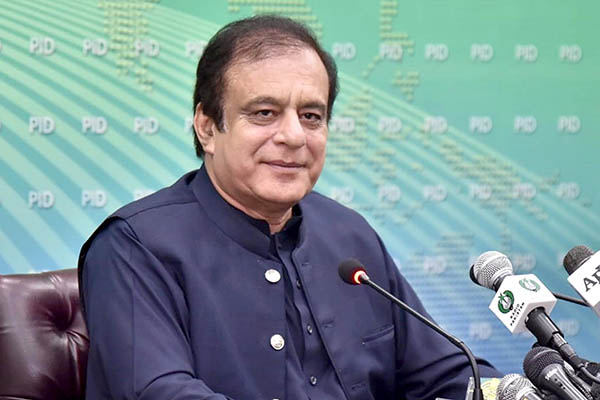
File photo of Science and Technology Minister Shibli Faraz. Courtesy PID
Science and Technology minister claims ECP’s objections are primarily related to capacity, not the machines that are increasingly controversial
The Pakistan Tehreek-e-Insaf (PTI)-led government on Wednesday dismissed the 37 reservations the Election Commission of Pakistan (ECP) has submitted on the use of electronic voting machines in the next general elections.
“Only 10 points were in direct objection to the electronic voting machine,” Science and Technology Minister Shibli Faraz told a press conference in Islamabad. “[The] other points related to the Election Commission’s capacity to use them,” he added.
Claiming that legislation required to utilize the EVMs—and allow Internet voting for overseas Pakistanis—would be completed this month, Faraz claimed the ECP would then have no choice but to obey the law. He also reiterated his calls for all political parties to have technical experts examine the machines developed by his ministry, even as the opposition continues to allege that the EVMs are merely a pretext for the incumbent government to rig the next general elections.
Stressing that the EVM developed by the Science and Technology Ministry was reflective of a “concept,” he claimed it was being opposed by forces that did not wish to participate in free, fair, transparent and credible elections even though the ECP document clearly expresses that the EVMs are likely to cause controversy rather than resolve the issues plaguing Pakistan’s electoral system.
Faraz said all previous elections had been made controversial and were marred by the use of money and intimidation as tools to influence the results, practices the ECP says would continue with EVMs. He also said fake ballot papers had been printed in the past, which the ECP has said could be replicated through machine tampering with EVMs.
Referring to the ECP’s reservations about the government’s “undue haste” in wanting to implement EVMs, the minister claimed two years were sufficient to procure and test the machines, as well as provide technical training for their operation.
To a question, he claimed 400,000 EVMs would be required for the next general elections. These could be produced within six months if 2,000 machines were manufactured each month, he said—a dubious assertion, as by the government’s own admission it cannot mandate the machines that the ECP would utilize and there is no guarantee the manufacturer could produce this many devices daily.
Faraz also rubbished reports of Rs. 150 billion being required to manufacture the required machines, claiming this was figure was “exaggerated.” He also clarified that the EVMs developed by the Science and Technology Ministry ran on batteries and did not require electricity.
ECP’s 37 objections
In a document submitted to the Senate Standing Committee on Parliamentary Affairs, the ECP listed 37 objections to the use of EVMs in the 2023 general elections, saying this was insufficient time to procure and deploy the devices, as well as train up staff to use them. It said that this would all but make it impossible to conduct nationwide polls in one day, as required under law.
The ECP also listed a slew of issues with the use of EVMs, including pointing out that they had been made controversial and lacked the support of all stakeholders. It said the system proposed by the government violated ballot secrecy, and did not provide necessary transparency in case of election disputes. It said “capacity” issues at all levels would also hamper their implementation.
The ECP emphasized that EVMs could not prevent low voters’ turnout, low women’s turnout, misuse of state authority, election fraud, electronic ballot stuffing, vote buying, dishonest polling staff, widespread political and electoral violence and abuse of state resources. It also noted that, despite claims by the government, several Western democracies that had introduced EVMs had been forced to abandon them due to lack of security.
